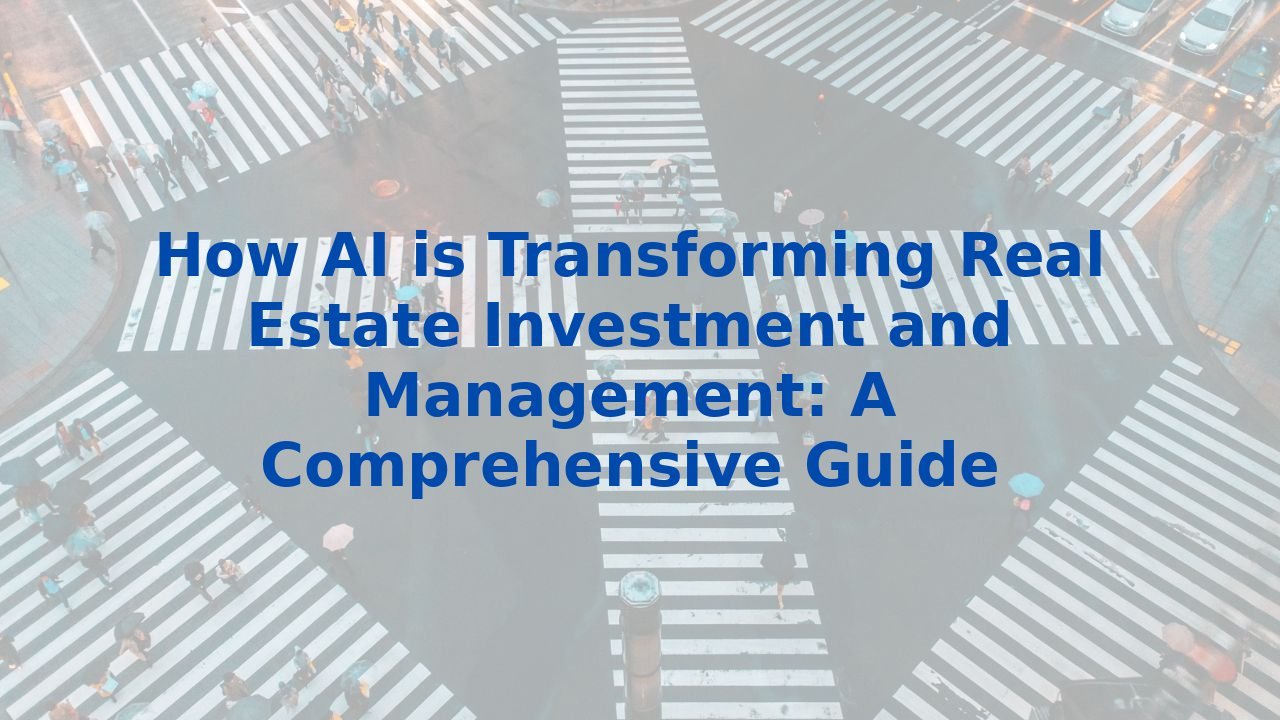How AI is Transforming Real Estate Investment and Management: A Comprehensive Guide
How AI is Transforming Real Estate Investment and Management: A Comprehensive Guide
The real estate industry is undergoing a seismic shift, propelled by advancements in artificial intelligence (AI). As investment holding and management companies strive to remain competitive, embracing AI technologies isn’t just an option; it’s becoming a necessity. In this guide, we'll explore how AI optimizes various business processes, enhancing efficiency and profitability across the sector.
1. Market Analysis and Trend Prediction
Understanding market dynamics is crucial for successful real estate investment. AI excels in predictive analytics, enabling investors to sift through vast historical and current market data to forecast property values and trends. By leveraging these insights, businesses can identify emerging trends and lucrative investment opportunities, making informed decisions regarding timing and location.
2. Property Valuation and Portfolio Optimization
Gone are the days of manual property assessments. AI-driven valuation systems use sophisticated algorithms to provide swift, accurate market value assessments by analyzing extensive datasets that include historical sales, property characteristics, and geographical factors. Not only does this improve appraisal accuracy, but it also ensures that decisions are data-backed.
Furthermore, AI tools can optimize investment portfolios by analyzing performance data and risk profiles. This empowers asset managers to allocate resources efficiently across various properties, aligning portfolios with both investment objectives and market conditions for maximized returns.
3. Deal Sourcing and Due Diligence
In the fast-paced world of real estate, time is of the essence. AI streamlines deal sourcing and due diligence processes, allowing investors to identify potential deals quickly based on their criteria. By automating the analysis of property listings and matching them with specific investor demands such as location and budget, these technologies reduce manual research efforts significantly.
4. Tenant Satisfaction and Retention
In multifamily real estate, tenant retention is paramount. AI enhances tenant satisfaction through proactive maintenance strategies, analyzing service requests and scheduling repairs before issues become critical. Moreover, AI-driven platforms can facilitate personalized communication, using insights from behavioral data to tailor services to individual tenants’ preferences.
5. Lease Management and Pricing
Optimizing rental income is key to sustaining profitability in real estate. AI aids in effective lease management by providing dynamic rental pricing strategies, adjusting rates in real-time based on seasonality, market demand, and property conditions. This adaptability ensures properties are competitively priced, resulting in higher occupancy rates and increased rental income.
6. Risk Mitigation
Investing in real estate inevitably comes with risks. Fortunately, AI can help mitigate these challenges by providing nuanced tenant assessments and identifying security anomalies. With the ability to analyze economic indicators and property-specific data, AI assists investors in identifying potential risks early, allowing for the formulation of systems to safeguard investments.
7. Operational Efficiency and Customer Experience
AI's impact extends beyond analytics; it transforms operational efficiency and elevates customer experiences. For instance, virtual property tours powered by AI and augmented reality provide prospective buyers and tenants with immersive views of properties, facilitating quicker and more informed decisions.
Additionally, AI-driven customer service platforms improve client interactions by predicting preferences and automating communications. Such advancements free up agents’ time, allowing them to focus on complex tasks that require personal touch, thus enhancing overall service quality.
Benefits of Training Employees for AI
While the potential of AI is immense, its impact is maximized when employees are equipped with the right skills and knowledge. Training staff in AI tools enhances their capabilities in interpreting data and making informed decisions, ultimately leading to better operational efficiency. A well-trained workforce is better positioned to adapt to new technologies and integrate them into existing workflows, ensuring sustainable growth in an evolving market.
Conclusion
The integration of AI in real estate investment and management is more than a trend; it’s a fundamental shift in the way business is conducted. From enriching market analyses and property valuations to enhancing operational efficiency and tenant experiences, AI fosters a new era of decision-making and profitability. As the landscape of real estate continues to evolve, adopting AI technologies is no longer a luxury but a strategic imperative for staying competitive and thriving in this dynamic sector.
To empower your organization and elevate your capabilities, consider investing in comprehensive AI training programs that equip your entire workforce with essential skills for the AI age.



